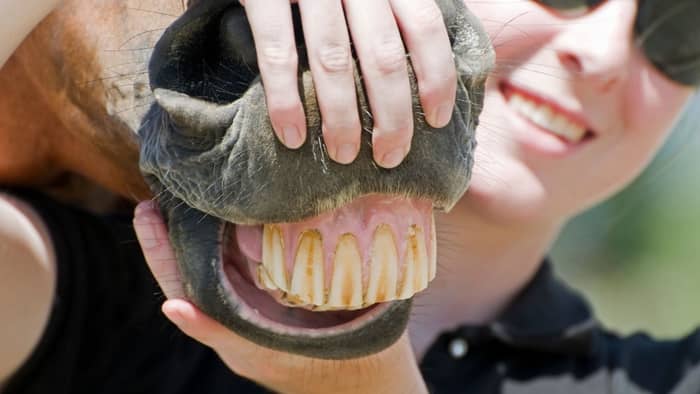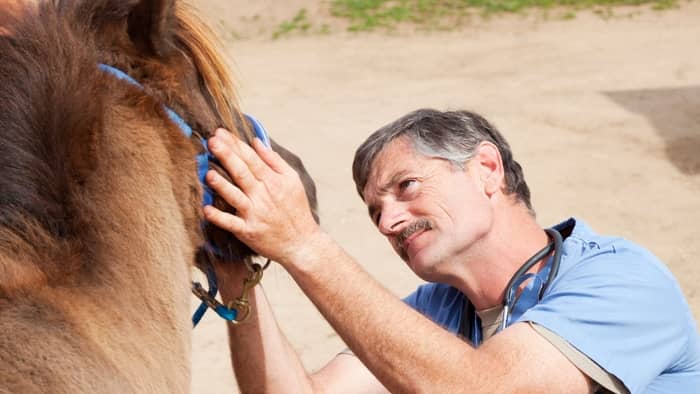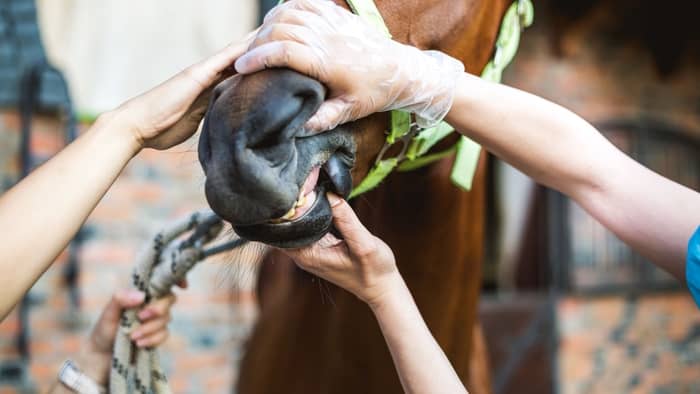Last Updated on June 13, 2022 by Guillermina
Excessive saliva in animals is rarely a good sign, so why do horses drool? While this is a common sight, it could sometimes indicate severe issues!
If you’ve ever neared your horse after they’ve eaten, you might have noticed that they have a lot of salivae. A slobbery kiss from your mare might make you happy, but it could indicate that something is amiss. You should always keep an eye on the amount of drool your horse produces. Keeping tabs on what’s normal for your horse and not could help save them.
In this article, I will tell you more about drooling in horses, why they do it, what it means and when you need to worry!
Why Do Horses Drool?
While it’s normal for horses to drool, excessive drooling might be a sign of bigger problems, especially if your horse drools so much that a puddle forms underneath them. Some of these reasons may be serious enough to warrant a visit to the vet.
Poisoning
Toxins found on field plants or grass could cause excessive drooling for your horse.
Clover
Clover is host to a parasitic growth that will cause slobbers – an illness horses develop when ingesting it.
While slobbers aren’t a harmful disease and will go away on its own, it is a nuisance because of excessive drooling.
Pesticides
Poisoning can be caused by allowing horses to graze in fields that have been sprayed with pesticides. This poses a severe health risk to them and other animals.
Spraying fields that produce livestock feed with pesticides have been banned in some states. Don’t allow your horse to graze in areas that have been sprayed. Contact the vet immediately if your horse has eaten feed from a field sprayed with pesticides.
Ragwort
A weed called ragwort can be toxic to horses. This weed is dangerous to those with allergies and hayfever too.
You can clear your pasture from ragwort with a special fork. Wear gloves, goggles, and a mask when doing so, especially if you’re allergic to the plant. You can also get a professional to clear it for you.
Grass Sickness
The worst cases of drooling are caused by grass sickness. The exact cause of the illness isn’t known, but the results are.
If your horse has grass sickness, paralysis develops in their gut, affecting their nervous system. Horses with grass sickness find it challenging to swallow excessive saliva, which often causes fatalities. While it is most common in Great Britain and Northern Europe, it can occur in other areas worldwide.
Injury
Horses can get injured orally from chewing something they shouldn’t or from a heavy-handed rider. When this happens, they can develop excessive drooling.
You need to regularly check your horse’s mouth on the inside and out to see if they have any injuries. If you find something, you can have it treated immediately. The quicker you identify an injury, the faster it’ll heal.
Also, ensure that people riding your horses know how to do so correctly. This will prevent injury and spare your horse a lot of pain.
Dental Problems
While checking your horse’s mouth for injuries, check for tooth spurs. These can irritate your horse’s tongue and cheeks and cause excessive drooling.
Call an equine dentist to resolve this issue. If you are not experienced enough in handling a tooth spur, you might cause injuries to both the horse and yourself.
Infection
A foul smell coming from your horse’s mouth may indicate an infection. This needs to be treated using antibiotics. Human antibiotics and herbal remedies are unsuitable for horse care, so call your vet if you notice this sign.
How To Minimize Drooling In Horses
Drooling can be managed by managing the cause thereof. If the reason is poisoning, eliminate the poison or overseed your pasture with grass seed to eliminate clover. Drooling caused by dental problems or infection can easily be handled by getting an antibiotic prescription from an equine vet.
Do Horses Develop Foam When They Drool?
Foam is caused by exercise and is typically a sign of a happy and healthy horse. Sometimes when a horse drools excessively, they might develop foam around their mouth, and then this is cause for concern.
Foam paired with excessive drooling can indicate underlying problems, and you should address this as soon as possible.
Is Excessive Horse Drooling A Problem?
Sometimes drooling can be normal for horses, but only if it isn’t excessive. Horses can drool up to 4 liters a day, but when it happens for a few days in a row, you should check them for any issues.
Final Words
Drooling is pretty normal for horses, and you’ll get a few slobbery experiences if you spend lots of time with yours! It’s essential to keep tabs on how much your horse drools and what’s standard for them.
If you notice that they’re excessively drooling, a visit from the vet should be on the books. Excessive horse drooling is almost always a sign that something is wrong, and the sooner you identify the cause, the easier it’ll be to help your horse.
I hope you found this article helpful and that I answered all your questions. If you have any more, check out our comments section to see what other members have asked, and pop your own questions there for me to answer!
FAQs
How do you treat drooling in horses?
Drooling is normal in horses, but there might be another reason for it when it's excessive. You'll have to treat excessive drooling in horses according to the cause.
If your horse develops slobbers, you can change their food and limit their access to pastures containing clover.
If they have dental issues, an equine vet can help you get them treated.
Do horses drool when they have colic?
Yes.
Horses can drool excessively when they have colic. Both symptoms are caused by slaframine poisoning.
Why do horses foam at the mouth after eating?
Horses produce a lot of salivae to help them chew and digest their food. After eating, you might notice foam due to the extra saliva they produced. If the foam persists long after they've eaten, there might be an underlying cause.


